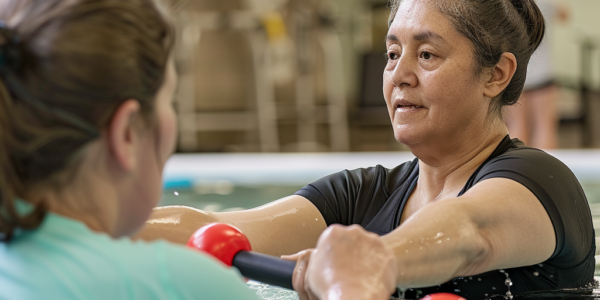New Study Sheds Light on Quality of Life for Adults with Congenital Heart Disease
A groundbreaking study in JAMA Network Open reveals new insights into the long-term quality of life for adults with congenital heart disease (CHD). The Congenital Heart Initiative (CHI), the largest patient-focused registry in the U.S., gathered data from over 4,500 participants, highlighting significant trends in health outcomes and the importance of patient engagement in research. Key findings indicate that while 88% of participants reported comorbidities, 84% rated their quality of life as good or better, emphasizing the need for tailored healthcare strategies.
The Benefits of Physical Activity for Middle-Aged Women
Discover the benefits of regular physical activity for middle-aged women and how it can positively impact health quality in later years. Dr. Jen Ashton shares insights on the long-term advantages of staying active and emphasizes the significance of incorporating exercise into daily routines for better health outcomes as we age. Learn how adopting a healthy lifestyle, including physical activity, can promote wellness throughout the aging process and enhance quality of life in older age.
Research Team Develops Next-Generation Printable Sensor Technologies
Research led by Vincenzo Pecunia from Simon Fraser University has advanced printable sensor technologies with the potential to revolutionize sustainability and improve quality of life. The team’s comprehensive roadmap covers 45 printable sensor technologies, focusing on integration into everyday objects and environments to provide real-time data for informed decision-making. Pecunia emphasizes the widespread dissemination of low-cost, easy-to-make sensor technologies as a key factor in realizing their potential, highlighting the sustainability benefits of printable materials over traditional production methods.
Stepped Collaborative Intervention Improves Quality of Life in Cancer Patients, Study Finds
A study published in The Lancet found that a stepped collaborative care intervention improved health-related quality of life for cancer patients with symptoms of depression, pain, or fatigue. The intervention included once-weekly cognitive behavioral therapy via telemedicine and resulted in significantly greater improvements in emotional, functional, and physical well-being compared to standard of care. The findings suggest potential benefits for integrated screening and care interventions in oncology settings.
Study Shows Exercise Reduces Pain and Fatigue in Women with Advanced Breast Cancer
Regular exercise has been found to have a positive impact on reducing pain and fatigue in women with advanced breast cancer, according to a new study. Anouk Hiensch, an assistant professor of epidemiology and health economics, emphasized the significance of offering exercise as part of the treatment regimen for patients with metastatic breast cancer. The study involved 357 patients with advanced breast cancer and revealed significant improvements in patients under the age of 50 and those experiencing higher levels of pain at the beginning of the study. Dr. Michail Ignatiadis hailed the findings as good news for patients with advanced breast cancer, indicating that they can potentially enjoy a better quality of life through regular exercise.
Modifying Chemotherapy Treatment Improves Lives of Older People with Cancer, Study Finds
A new study published in JAMA Network Open reveals that modifying chemotherapy treatment for older people with cancer can significantly enhance their lives without compromising treatment goals. Dr. Mostafa R. Mohamed, MD, PhD, and Dr. Supriya G. Mohile, MD, MS, led the study, analyzing data from over 600 participants aged 70 and above. The study found that modifying the amount and schedule of chemotherapy for older patients with advanced illness can allow them to avoid toxic side effects and maintain their ability to perform daily activities independently.
Study Reveals Impact of Long COVID on Exercise
A recent study has revealed that long COVID can have a significant impact on a person’s ability to exercise, beyond just causing chronic fatigue. Dr. Salman Bhai, the director of the neuromuscular center at the Institute for Exercise and Environmental Medicine at Texas Health Dallas, shared insights on how individuals with long COVID can still maintain an exercise routine. Dr. Bhai emphasized the importance of developing patient-specific exercise plans and goals in collaboration with a multidisciplinary team, tailored to individual needs and focusing on gradual progression over 6 to 12 months. The approach to exercise for individuals with long COVID involves gently pushing oneself within the tailored plan, without trying to catch up to previous levels of fitness. Dr. Bhai’s insights provide hope for individuals dealing with long COVID, offering a structured and patient-specific approach to gradually reintroducing physical activity and improving overall well-being.
New Magnetogenetics Technique Shows Promise in Treating Parkinson’s Disease
Researchers have made a significant breakthrough in the treatment of Parkinson’s disease using a new technique called magnetogenetics. This innovative approach involves using very small magnets to wirelessly trigger specific, gene-edited nerve cells in the brain, effectively relieving motor symptoms…








